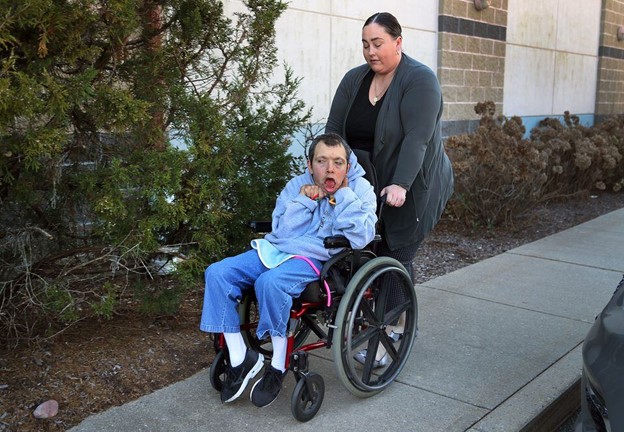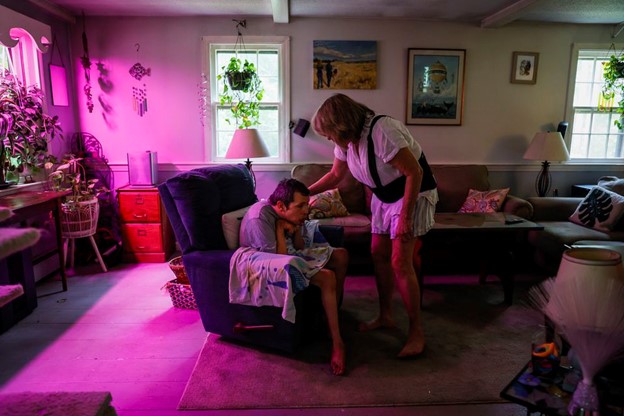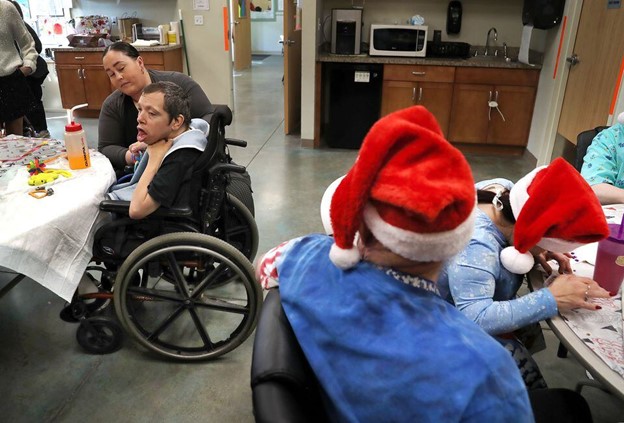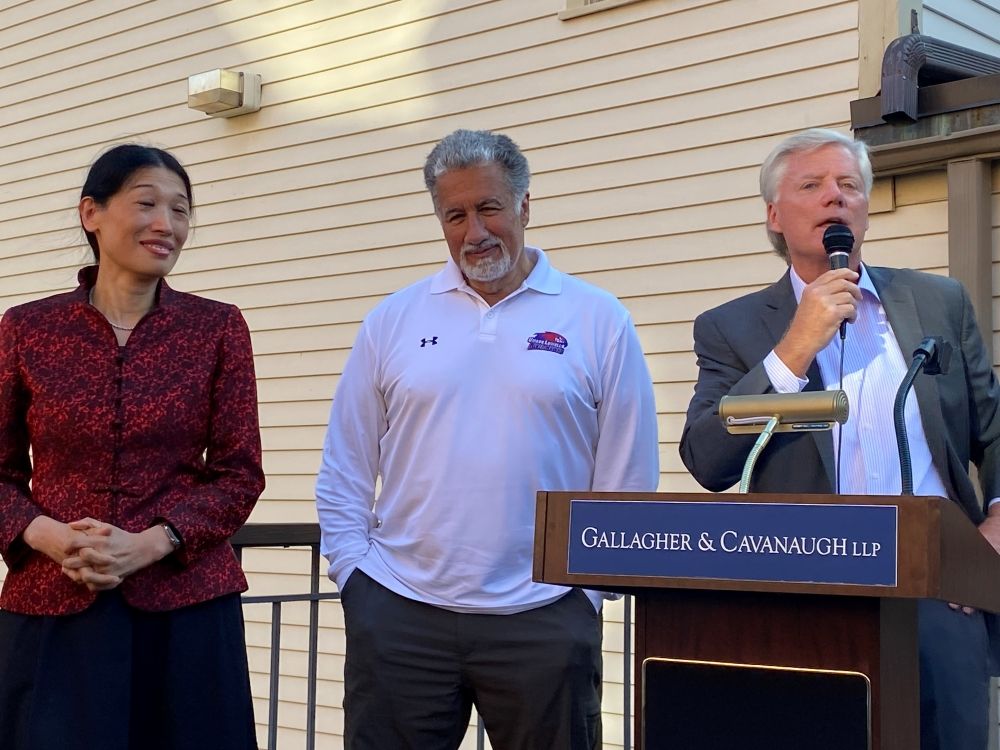January 11, 2024
State investment this year helped, but didn’t solve, long waiting lists at programs for people with complex disabilities [The Boston Globe]

By Jason Laughlin Globe Staff, Updated January 1, 2024, 4:23 p.m.

Betsy Bourne wears a back brace after helping her son Tyler walk from his electric chair to his recliner where he will spend the majority of the day in Centerville, Mass.ERIN CLARK/GLOBE STAFF
MASHPEE — Hundreds of people with developmental disabilities have finally returned to critically important day programs thanks to new investment from MassHealth. But many more remained on waiting lists last fall, exiled from programs they’re entitled to attend.
Programs still don’t have the staff to serve everyone eligible, providers reported. Statewide, 20 percent of jobs at day habilitation programs were unfilled as of October, according to a survey of members conducted by the Association of Developmental Disabilities Providers and shared with the Globe.
The day programs offer skilled nursing, physical therapy, speech therapy, group outings, and opportunities to socialize for people with developmental disabilities.
“Day hab is very hard work,” said Jean Yang, chief executive of Vinfen, a Cambridge-based nonprofit running six day-hab programs in the state. “We have a long way to go to get to a workforce willing to come in and also stay.”
People with the most complex medical and behavioral needs require one-on-one care, so staff shortages affect them directly. Shortages grew to acute levels during the pandemic, and roughly 2,000 Massachusetts residents were shut out of them.
Day hab programs are not alone in their struggle to find and retain workers. Understaffing is endemic statewide at programs that provide services for people with developmental and intellectual disabilities, the Association of Developmental Disabilities Providers survey found. Nursing and direct-care jobs are particularly hard to fill.
New financial supports for day hab programs this summer have made a difference, though. MassHealth, the state’s Medicaid administrator, recognized that understaffing was affecting care and made “a significant investment,” said Ellen Attaliades, chief executive of the Association of Developmental Disabilities Providers, which represents a majority of providers in Massachusetts. Most significant, MassHealth this year introduced a 33 percent rate increase that contributed to an estimated additional $200 million for day hab and adult day health programs.
Also this summer, MassHealth introduced an emergency program that paid providers bonuses of $12,000 for every former client brought back to a day hab program, and $2,000 for each new client admitted. The state has awarded $230,000 in bonuses as of early December, MassHealth reported, and more payouts are likely.
Staff vacancies at day hab programs declined from March to October, the recent survey found, as providers hired, gave raises, and offered retention bonuses. Meanwhile, the number of former day hab clients on waiting lists shrunk by 35 percent.
Yet more than 1,400 new and former clients remained on waiting lists among the day hab providers polled. Those counts probably have shrunk since the survey was taken, Attaliades said.
At Vinfen, which received bonuses for bringing back four clients to its day hab programs, workers’ wages rose to about $20 an hour, Yang said. About a quarter of jobs at the company’s six-day hab programs are vacant, down from more than half near the beginning of this year.
The pay there, though, still isn’t on par with what people can make in other jobs, Yang said, which is closer to $25 an hour.
“I think, the type of work and the rate of pay, people can go work at Starbucks, or they can go to work at big-box stores, making more money with less of the complexity of serving people face to face,” Attaliades said.
Statewide, 7,272 people attended day hab programs as of September, MassHealth reported.
One former client who returned is Tyler Bourne, a Centerville man who needs assistance with most activities, including eating and dressing. He attended day hab only intermittently over the past three years, but returned to a program run by Community Connections Inc. in Mashpee almost a month ago.
“Him being back is the best thing that’s happened for him in nine months,” his mother, Betsy Bourne, said.

Tyler Bourne, a developmentally disabled man has returned to the adult day care at Community Connections after he was barred for most of the past three years.JOHN TLUMACKI/GLOBE STAFF
The Globe profiled the 38-year-old Bourne, who was born with a rare chromosomal disorder, and his mother this summer. Without access to the day program, Bourne regressed, losing much of his limited ability to walk. At times this year, he didn’t leave the house for days, instead languishing in an easy chair in his mother’s living room.
Betsy Bourne, meanwhile, gave up her job and most activities outside the house to care for him. She suffered a back injury from the strain of moving her 100-pound son from room to room.
Bourne attended a mid-December holiday celebration at the day program, surrounded by about a dozen others in a community room decked with garlands, where Christmas carols played from a speaker. Others at the program crafted snowmen and angels. His disabilities prevented him from making his own art, but he seemed stimulated and even laughed. His days there can include walks, trips to nearby parks, and physical therapy designed to keep him from losing more of his physical capacity.
Jade Silva, who gave him one-on-one care recently, has worked at the day hab for 19 years and said Bourne has changed since returning.
“He seems a lot happier,” she said. “He settles right in.”
Silva’s role helping Bourne is evidence of how stretched the program is. Direct care for clients isn’t her job, but one of the people who helped Bourne left the job, and Silva is filling in until another can be hired.
Understaffing at programs for people with developmental or behavioral disabilities is particularly acute on Cape Cod, said David Botting, Community Connections’ chief executive. The company has eight day hab programs, Botting said, and those on Cape Cod, where the cost of living is high, often have twice the job vacancies as programs elsewhere in the state.

Community Connections staff member Jade Silva took Bourne for a stroll outside the day hab facility on Dec. 15.JOHN TLUMACKI/GLOBE STAFF
Community Connections received two incentive bonuses to bring back former clients, and six for admitting new clients, which helped pay for staff retention bonuses.
For most of the past year, caring for her son consumed Betsy Bourne. Now, she sometimes forgets he’s out of the house and finds herself talking to him when he’s not there. She has time, she said, to get the physical therapy her back needs.
“I couldn’t do the therapy because I couldn’t get out of the house,” she said.
She’s hoping that in the new year, if she feels ready, she might start working again, too.
“There’s so many things I’ve neglected about the house, about myself, since he’s been home,” she said. “I think I’m recovering.”
Jason Laughlin can be reached at [email protected]. Follow him @jasmlaughlin.
This article has been repurposed from The Boston Globe. You can find the original article here.






